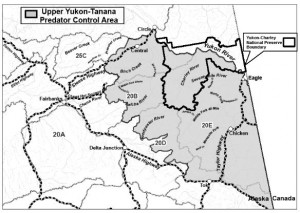Alaska’s predator control program has resulted in the number of wolves in Yukon-Charley Rivers National Preserve dropping by more than half, according to the National Park Service.
The Park Service counted 80 wolves in 9 packs in November, 2012. This spring, biologists have only been able to account for 28 to 39 wolves in six packs.
That’s more than a 50 percent drop, which is the highest drop in population since the park service began tracking wolves 19 years ago says Deb Cooper, Associate Regional Director for NPS.
Natural deaths and subsistence and sport hunting and trapping account for some of the loss, but Cooper says those rates are fairly consistent from year to year.
“This year there has been predator control efforts along the boundary of Yukon-Charley Rivers National Preserve, particularly in the 70-mile country which is kind of bounded on three sides by the preserve. The predator control program has taken quite a few animals. We know a number of them are from packs that are previously monitored.”The Park service will be closely monitoring the wolves to see if the numbers can rebound.
“As long as there is a breeding pair or some sort part of the pack structure intact, they can come back. This year, we know that we lost one pack that was 24 animals in size. There was two other packs that we think there’s only one animal left which is really no longer a pack, just a transient animal. When you lose whole packs that can have more of a long term effect.”

Fish and Game’s Upper Yukon Tanana Predator
Control Program Area. (Image from Annual Report to the Alaska Board of
Game on Intensive Management for Moose and Caribou with Wolf Predation
Control in the Upper Yukon/Tanana Rivers – February 2013)
“We have two different mandates. It’s the state’s policy to grow caribou and moose for hunters. Which in this case is involving the manipulation of populations of ungulates and predators and we’re bumping up against the preserve which has the responsibility and obligation to preserve the natural dynamics of an ecological system,” Cooper says.
source


No comments:
Post a Comment